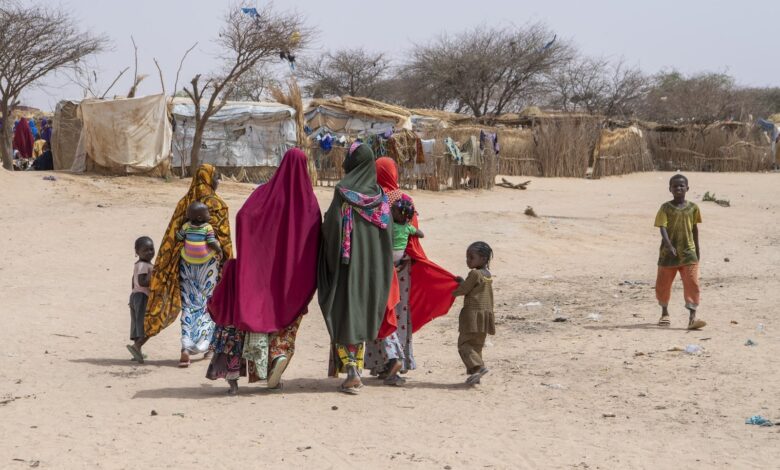Violence In Lake Chad Basin Drives 360,000 Refugees Into Niger Republic
The UN Refugee Agency says it is alarmed by repeated attacks in the Lake Chad Basin which have forced more than 36,000 people to flee across the borders into neighbouring Niger in four months.

Violence in Mali, Nigeria and Burkina Faso has forced 360,000 refugees to flee to Niger Republic with 10 per cent of the influx being between Jan. and mid-April 2022, raising concerns over the deteriorating humanitarian situation in the Lake Chad Basin.
Niger is facing an overlapping threat from the Islamic State terrorists and other non-state armed groups in neighbouring countries, and farmer-herder disputes linked to climate change effects.
Since 2017, violent attacks related to Al-Qaeda and the Islamic State group, which is also active in Mali and Burkina Faso, have occurred in the unstable districts of Tahoua and Tillaberi, in the tri-border zone between Burkina Faso, Mali, and Niger.
Between Jan. and mid-April, 2022, the number of refugees fleeing to Niger reached 36,000, with an average of more than 2,500 new arrivals recorded every week, according to the United Nations High Commissioner for Refugee (UNHCR).
The new arrivals are fleeing from clashes between the Islamic State in the Greater Sahara and the Touareg Movement for the Salvation of Azawad (MSA) in northern Mali, especially areas of Gao and Menaka, the UNHCR said on Wednesday, May 4.
Those from Nigeria —mostly women and children— are fleeing violence in the Northwest states of Katsina, Sokoto, and Zamfara where attacks, looting and kidnapping by armed groups have prompted air raids by the Nigerian security forces.
With a population of 580,000 forcibly displaced people, Niger currently hosts more 200,000 Nigerian refugees — more than 57,000 who are from Northwest Nigeria are in Maradi region and 15,000 in Tahoua region, according to the UN refugee agency.
At least 13,000 refugees from Burkina Faso also reside in Niger Republic.
“Displacement from Burkina Faso is caused by ongoing and spreading insecurity,” the agency said.
Food insecurity
The overlapping conflict has contributed to food shortages in Niger as attacks on villages have prevented farmers from cultivating their fields. The situation is worsened by drought.
According to IPC forecasts (Integrated Food Security Phase Classification), by June 2022, as many as 3.6 million people in Niger could be in a situation of food crisis (IPC phase 3 or above), that is, 15 per cent of the population.
The continuous influx has restrained Niger’s limited resources and food prices have risen dramatically, putting “already vulnerable refugees and local communities alike further at risk.”
“The refugees, who are mostly women and children, need shelter, food and water, non-food items and access to basic services such as healthcare and education,” the UNHCR said.
“The fact that they are arriving and settling in some of Niger’s driest areas makes their situation even more precarious.”
Hunger conditions have exacerbated an already severe nutritional situation in the country as nearly 1.3 million children suffer from acute malnutrition.
HumAngle has analysed how the nutritional crisis is dire in Maradi region where conflict has eroded people’s means of livelihood.
Funding shortfalls
Humanitarian actors are concerned that aid funding in the country has plummeted in recent years.
The funding shortfalls may get complicated with the Russia-Ukraine war as donor agencies are diverting funding to support the humanitarian conditions in Ukraine.
In Niger’s Humanitarian Response Plan 2022, $552.6 million is required to fund all humanitarian services; only 9 percent has been covered so far.
“As much as we remain committed to delivering life-saving aid and working closely with the local authorities and host communities on the front lines of the response, stabilisation and development interventions must kick-in early and quicker. As humanitarians, we are reaching our limits,” Emmanuel Gignac, UNHCR’s Representative in Niger, said.
Appeal
Antonio Guterres, the UN Secretary-General, on Monday, urged the international community to “fully invest” to help Niger fight insurgents threatening the government in Niamey and neighbouring countries.
“While terrorist attacks continue to increase in the Sahel and spread to the states on the Gulf of Guinea, the international community has to understand it is no longer just a regional African question, but really is a global threat,” Guterres said, during his visit to Niger President Mohamed Bazoum.
Guterres began his African tour on Saturday in Dakar, Senegal’s capital and concluded his trip on Wednesday with a trip to Nigeria.
Support Our Journalism
There are millions of ordinary people affected by conflict in Africa whose stories are missing in the mainstream media. HumAngle is determined to tell those challenging and under-reported stories, hoping that the people impacted by these conflicts will find the safety and security they deserve.
To ensure that we continue to provide public service coverage, we have a small favour to ask you. We want you to be part of our journalistic endeavour by contributing a token to us.
Your donation will further promote a robust, free, and independent media.
Donate HereStay Closer To The Stories That Matter




